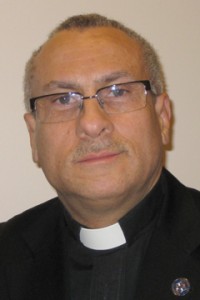
By Stuart Mann
The Ven. Peter Fenty, archdeacon of York and the executive officer to the Bishop of Toronto, was elected suffragan bishop in the Diocese of Toronto on April 6.
Bishop-elect Fenty, who was born and raised in Barbados and came to Canada in 1992, will be the first person of African descent to be a bishop in the Anglican Church of Canada.
“This is a historic moment in the life of the Anglican Church in Canada, but I want to make it very clear that I will be a bishop for all of God’s people,” he said in an interview after the election at St. James Cathedral in Toronto.
Bishop-elect Fenty, 61, was elected on the seventh ballot. The Rev. Canon Andrew Asbil, the incumbent of the Church of the Redeemer, Toronto, was the runner-up, followed by the Rev. Canon Stephen Peake, the incumbent of St. Bride, Clarkson.
The other nominees were the Rev. Canon Allan Budzin, the Ven. Gordon Finney, the Rev. Canon Isaac Kawuki-Mukasa, the Rev. Mark Kinghan, the Rev. Warren Leibovitch, the Rev. Canon Jennifer Reid, the Rev. Nicola Skinner and Major the Rev. David Warren.
In a show of unity after the election, all the candidates threw their support behind Bishop-elect Fenty.
This was Bishop-elect Fenty’s sixth time running in an episcopal election. “I’ve learned more and more that in God’s time, things happen,” he says. He had no plans to enter the election until friends urged him to reconsider. He only made up his mind to enter after his annual retreat in Boston in January.
He says he “never dreamed” of being a priest in Canada, let alone being a bishop here. “From a very young age, I thought I had a call to priesthood, but I always thought that if I became a priest, I would serve in the Caribbean,” he says.
He was ordained a priest in Barbados in 1975 and was the rector of three parishes there. In 1992, he accepted an invitation to become the rector of St. Lawrence church in the Diocese of Montreal. In 1997, he became the incumbent of St. Joseph of Nazareth in Brampton in the Diocese of Toronto. Since 2004, he has been the archdeacon of York and the executive officer to the Bishop of Toronto.
As the executive officer, he has worked closely with the College of Bishops, the five-person group that provides episcopal oversight of the diocese. He oversees the diocese’s Fresh Start and Momentum programs and is the co-chair of the diocese’s postulancy committee. He has also served the church at the national level, most recently as a member and advisor to the Multicultural Ethics Committee and co-chair of the Partners in Mission and Eco-justice Committee.
“I want to see our church become more missional in its thrust, and that’s what we’re already doing,” he says. “I want to affirm the lay leaders in our church, who do great work. I want to see the raising up of vocations, particularly those in what we call ethnic congregations.”
He says he is particularly looking forward to working with the clergy and laity in the episcopal area where he will be appointed. Archbishop Colin Johnson said he will make the appointment within the next two weeks. Bishop George Elliott, the area bishop of York-Simcoe, is retiring this month.
Bishop-elect Fenty, who will be consecrated at the cathedral on June 22, praised the other nominees in the election. “I have a deep respect for every one of them. They’re fine clergy who do fine work.”
Archbishop Johnson said he is looking forward to working with Bishop-elect Fenty. “Peter has a vast range of knowledge of the diocese. He brings good organizational skills and he is a compelling preacher and interpreter of scripture. He has a deep faith and is theologically articulate. He has sensitivity not just to the Caribbean community but to a wide range of communities, including some minority communities in the life of the church who are not otherwise well represented. I think he has wonderful gifts that he is bringing.”
For the first time in the history of the diocese, Synod members used electronic devices to vote.
For photos from the election, visit the Diocese’s Facebook page.